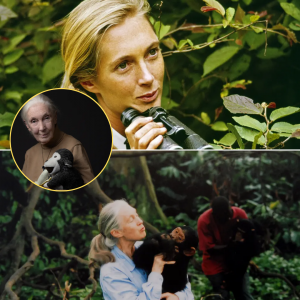Renowned anthropologist and conservationist Jane Goodall, whose groundbreaking research transformed our understanding of chimpanzees, has died at the age of 91.
The legendary British scientist, best known for her lifelong study of chimpanzees, died of natural causes in California during a stop on her speaking tour, the Jane Goodall Institute announced on Wednesday.
“The Jane Goodall Institute has learned this morning, Wednesday, October 1, 2025, that Dr. Jane Goodall DBE, UN Messenger of Peace and Founder of the Jane Goodall Institute, has passed away due to natural causes,” the organization said on Instagram.
“She was in California as part of her speaking tour in the United States. Dr. Goodall’s discoveries as an ethologist revolutionized science, and she was a tireless advocate for the protection and restoration of our natural world.”
The famed ethologist first ventured to Gombe, Tanzania, in 1960 when she was 26 years old to begin her groundbreaking research on wild primates.
After immersing herself in the wild, her research revealed that chimpanzees display a range of human-like behaviors, including communication, individual personalities, and the ability to make and use tools, according to the foundation’s website.
“Her field research at Gombe transformed our understanding of chimpanzees and redefined the relationship between humans and animals in ways that continue to emanate around the world,” the website says.
The trailblazing primatologist founded the Jane Goodall Institute in 1977 to support chimpanzee research and conservation in Africa. Since then, the nonprofit’s work has expanded worldwide, encompassing environmental education, community health, and global advocacy.
“What the chimps have taught me over the years is they’re so like us,” Goodall, who first became fascinated with animals when she learned to crawl, told the Associated Press during an interview in 1997. “They’ve blurred the line between humans and animals.”
Her global advocacy work included spending an average of 300 days a year traveling the world, meeting with officials and speaking to communities and schools to educate and inspire action.
But when the COVID-19 pandemic struck in 2020 and halted her speaking tours, she launched a podcast from her childhood home in London, England, to continue her astonishing outreach.
“If one wants to reach people; If one wants to change attitudes, you have to reach the heart,” Goodall, who published dozens of books, including her bestselling autobiography “Reason for Hope,” said during her first episode.
“You can reach the heart by telling stories, not by arguing with people’s intellects.”
Goodall was named a UN Messenger of Peace in 2002 and was awarded the Presidential Medal of Freedom – the nation’s highest honor – by former President Joe Biden in 2025.
She also won the prestigious Templeton Prize in 2021 – an award that honors individuals whose life’s work exemplifies the integration of science and spirit.
“Her groundbreaking discoveries have changed humanity’s understanding of its role in an interconnected world, and her advocacy has pointed to a greater purpose for our species in caring for life on this planet,” the prize’s citation said at the time.
With Post wires.









